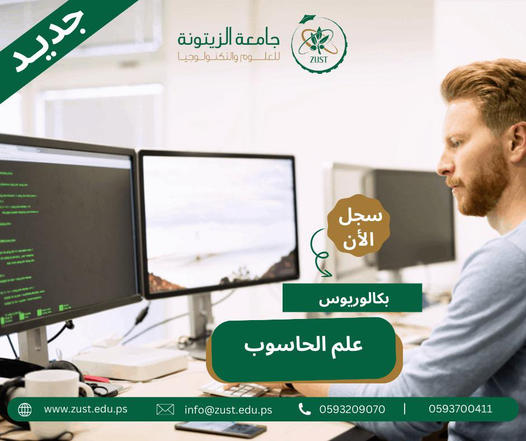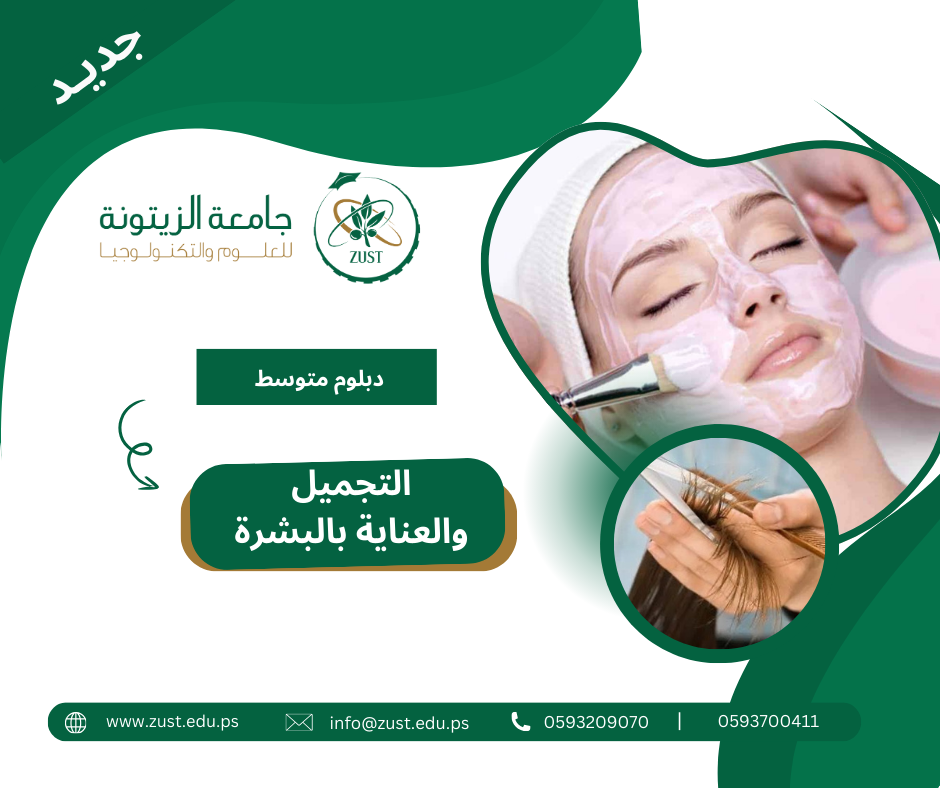Robot engineering and control
Technology & Engineering
Technology & Engineering
This program is offered for the first time in Palestinian universities, and grants a bachelor's degree with a total of 158 credit hours. The program targets students from the scientific track who have obtained high scores in the "Tawjihi" exam and fulfill the other conditions of the college's admission policy. The program aims to provide high and modern engineering education in the field of automation and robotics to support the production and service sectors with the aim of achieving national economic growth. Graduated engineers will be able to use and develop control systems and robotics and conduct scientific research in this vital discipline.
Establishing an engineering and academic department with a modern and advanced specialization in the engineering, construction and operation of robotics. This field covers very broad applications in all aspects of our modern life as it is associated with the science of Artificial Intelligence, Big Data, Internet of Things, micro-sensors and vision control systems. Control engineering and robotics technology have become an integral part of these modern sciences and applications and their use in industry, health, security, and human assistance. Providing higher engineering education in the field of automation and robotics to support the production and service sectors with the aim of achieving national economic growth. In addition to graduating engineers who are able to use and develop control systems and robotics, and conduct scientific research in this vital discipline.
Providing higher education in Palestine with a qualitative and modern specialization, which is automation and robotics.
Graduating engineers with a solid scientific background and a deep understanding of basic sciences due to the importance of this background in control and automation.
The ability to design automatic control systems and to program, handle and maintain automated and robotic systems.
Ability to work and interact with multidisciplinary teams on automated production sites.
Possess good communication skills in writing and speaking and the ability to express and document ideas.
The ability to solve engineering problems, design experiments, 3D models, and analyze information to develop automated systems.
The ability to use modern engineering and technological skills in practical application in automated projects.
The ability to support scientific research and publishing activities in the field of control and robotics.
This specialization also aims to create an academic environment that encourages faculty members to perform their teaching, educational and research roles to achieve the department's goals.
The program aims to graduate specialized engineers who are able to:
Possess basic concepts and sciences and understand their importance in developing control systems and designing robots.
Design, analysis and programming of control systems that include the areas of industrial automation, elevator control cards and electric motors.
Designing 3D models for robots and mastering and developing programs for designing robotic arms for robotic welding and control applications in factory production lines.
The application of the sciences of artificial intelligence, big data, the Internet of Things, and micro-sensors in control and automation systems.
Design engineering and technological production sites for robots and control systems with high and accurate specifications.
Dealing with the engineering team with its various mechanical, electrical and software specializations in automated production sites.
Testing, evaluating and identifying technical problems in automated production sites and collecting and analyzing the required data to reach appropriate solutions for the maintenance and development of automated systems.
Application of automated systems and automation in a hazardous environment such as mining and deep sea works.
Providing consultancy and engineering and technological services in the areas of control and automation.
Possession of communication skills in writing and speaking and the ability to express and document ideas in both Arabic and English.
Governmental and private sectors working on related projects.
Industry and related services sectors.
Entrepreneurship and private innovative projects.
Engineering and technology incubators and development centers.
Research institutions and scientific societies.
Local and international counseling centers.
برنامج البكالوريوس
كلية الهندسة والتكنولوجيا – خطة 2024
تخصص الروبوت والتحكم
أولا: متطلبات الجامعة الاجباري وعددها 17 ساعات معتمده
|
رمز المقرر |
اسم المقرر |
الساعات |
المتطلب السابق |
|
UR00101 |
اللغة العربية |
3 |
|
|
UR00111 |
اللغة انجليزية 1 |
3 |
|
|
UR00112 |
اللغة انجليزية 2 |
3 |
UR00112 |
|
UR00121 |
Culture & civilization |
3 |
|
|
UR00122 |
دراسات فلسطينية |
3 |
|
|
UR00131 |
مهارات الحاسوب |
1 |
|
|
UR00141 |
مهارات القيادة |
1 |
|
ثانيا: متطلبات الكلية الاجباري وعددها 22ساعة معتمدة
|
رمز المقرر |
اسم المقرر |
الساعات |
المتطلب السابق |
|
ETBS101 |
(Calculus(1 |
3 |
|
|
ETBS102 |
(Calculus(2 |
3 |
((ETBS101 (Pre) |
|
ETBS251 |
Engineering Programming |
3 |
|
|
ETBS111 |
(General Physics(1 |
3 |
|
|
ETBS112 |
(General Physics(2 |
3 |
((ETBS111 (Pre) |
|
ETBS113 |
.Physics Lab |
1 |
|
|
ETBS131 |
Hand Engineering Drawing |
1 |
|
|
ETBS132 |
Engineering Drawing by Computer |
1 |
((ETBS131 (Pre) |
|
ETBS141 |
(Workshop(1 |
1 |
|
|
ETBS142 |
(Workshop(2 |
1 |
((ETBS141 (Pre) |
|
ETBS261 |
Engineering Ethics |
1 |
((UR00111 (Pre) |
|
ETBS362 |
Scientific Research & Technical Writing |
1 |
((ETBS261 (Pre) |
|
ETBS103 |
Introduction to Environmental Engineering |
3 |
|
ثالثا: متطلبات التخصص الاجباري وعددها 68 ساعة معتمدة
|
رمز المقرر |
اسم المقرر |
الساعات |
|
ETBS201 |
Applied Engineering Math |
3 |
|
ETBS202 |
General Chemistry |
3 |
|
ETBS204 |
Differential Equations for Engineers |
3 |
|
ETBS301 |
Numerical Analysis for Engineers |
3 |
|
ETBS302 |
Statistics & Probability for Engineers |
3 |
|
ETCR222 |
Logic Circuits |
3 |
|
ETCR231 |
Engineering Mechanics |
3 |
|
ETCR232 |
Engineering Materials |
3 |
|
ETCR323 |
Embedded Systems |
3 |
|
ETCR341 |
Measurements & Instrumentations |
3 |
|
ETCR342 |
Automatic Control |
3 |
|
ETCR371 |
Engineering Training |
0 |
|
ETCR411 |
Multi Robotics System |
3 |
|
ETCR425 |
Intelligent Control Systems |
3 |
|
ETCR433 |
Dynamic systems and Vibrations |
3 |
|
ETCR441 |
.Measurements & Instrumentations Lab |
1 |
|
ETCR442 |
Automatic Control Lab |
1 |
|
ETCR443 |
Modern Control Systems |
3 |
|
ETCR451 |
Digital Signals Analysis |
3 |
|
ETCR452 |
Communication and Computer Networks |
3 |
|
ETCR453 |
Programmable Logic Controllers |
3 |
|
ETCR454 |
Automatic Control II Lab |
1 |
|
ETCR461 |
Automation |
3 |
|
ETCR462 |
Robotics Systems |
3 |
|
ETCR471 |
(Graduation Project(1 |
1 |
|
ETCR542 |
Industrial Process Control |
3 |
|
ETCR544 |
Real-Time Systems |
3 |
|
ETCR563 |
.Robotics Systems Lab |
1 |
|
ETCR571 |
(Graduation Project(2 |
3 |
|
ETCR575 |
Engineering Economy and Administration |
3 |
|
ETDN221 |
Electromagnetic |
3 |
|
ETDN311 |
Electric Machines |
3 |
|
ETDN312 |
.Electric Machines Lab |
1 |
|
ETRE221 |
(Electric Circuits(1 |
3 |
|
ETRE222 |
(Electric Circuits(2 |
3 |
|
ETRE223 |
.Electric Circuits Lab |
1 |
|
ETRE224 |
Electronics |
3 |
|
ETRE226 |
.Electronics Lab |
1 |
|
ETRE323 |
Power Electronics |
3 |
|
ETRE331 |
Fluids Mechanics & Hydrology |
3 |
|
ETRE401 |
Modeling & Simulation |
3 |
رابعا: متطلبات التخصص الاختياري وعددها 3 ساعة معتمدة
|
رمز المقرر |
اسم المقرر |
الساعات |
|
ETCR527 |
Neural Networks and Fuzzy Logic |
3 |
|
ETCR543 |
Non Linear Control |
3 |
|
ETCR545 |
Quality Standards and Reliability |
3 |
|
ETCR546 |
Flexible Manufacturing Systems |
3 |
|
ETCR547 |
Optimal Control Theories |
3 |
|
ETCR561 |
Safe Robotics Navigation Theories |
3 |
|
ETCR562 |
Special Topics in Control and Robotics |
3 |
|
ETCR581 |
Adaptive Control Systems |
3 |





















